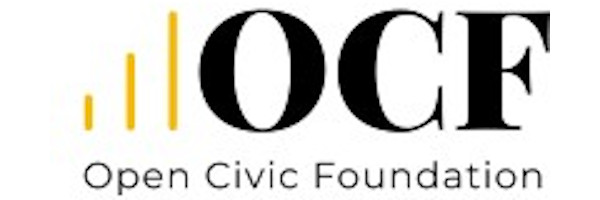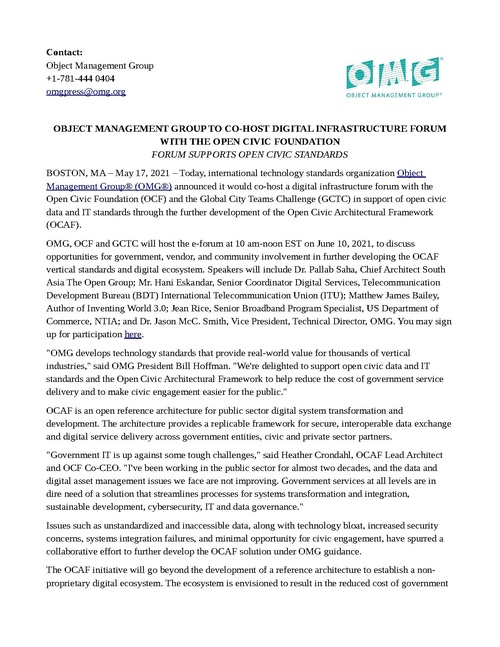Digital Infrastructure Forum
| News | |
| Image | 
|
|---|---|
| Published | 2021-05-17 |
| Point(s) of Contact | |
| Organization(s) | Object Management Group Open Civic Foundation Global City Teams Challenge |
| Where | Boston MA |
| Display | Yes |

| |
Today, international technology standards organization Object Management Group® (OMG®) announced it would co-host a digital infrastructure forum with the Open Civic Foundation (OCF) and the Global City Teams Challenge (GCTC) in support of open civic data and IT standards through the further development of the Open Civic Architectural Framework (OCAF).
OMG, OCF and GCTC will host the e-forum at 10 am-noon EST on June 10, 2021, to discuss opportunities for government, vendor, and community involvement in further developing the OCAF vertical standards and digital ecosystem. Speakers will include Dr. Pallab Saha, Chief Architect South Asia The Open Group; Mr. Hani Eskandar, Senior Coordinator Digital Services, Telecommunication Development Bureau (BDT) International Telecommunication Union (ITU); Matthew James Bailey, Author of Inventing World 3.0; Jean Rice, Senior Broadband Program Specialist, US Department of Commerce, NTIA; and Dr. Jason McC. Smith, Vice President, Technical Director, OMG. You may sign up for participation here.
"OMG develops technology standards that provide real-world value for thousands of vertical industries," said OMG President Bill Hoffman. "We're delighted to support open civic data and IT standards and the Open Civic Architectural Framework to help reduce the cost of government service delivery and to make civic engagement easier for the public."
OCAF is an open reference architecture for public sector digital system transformation and development. The architecture provides a replicable framework for secure, interoperable data exchange and digital service delivery across government entities, civic and private sector partners.
"Government IT is up against some tough challenges," said Heather Crondahl, OCAF Lead Architect and OCF Co-CEO. "I've been working in the public sector for almost two decades, and the data and digital asset management issues we face are not improving. Government services at all levels are in dire need of a solution that streamlines processes for systems transformation and integration, sustainable development, cybersecurity, IT and data governance."
Issues such as unstandardized and inaccessible data, along with technology bloat, increased security concerns, systems integration failures, and minimal opportunity for civic engagement, have spurred a collaborative effort to further develop the OCAF solution under OMG guidance.
The OCAF initiative will go beyond the development of a reference architecture to establish a non-proprietary digital ecosystem. The ecosystem is envisioned to result in the reduced cost of government service delivery, increased digital economic development, and make civic engagement easier and more transparent for the public while improving public services for a better constituent quality of life.
The Open Civic Architectural Framework also has ties to the Global City Teams Challenge (GCTC). The GCTC program is a collaborative platform for the development of smart cities and communities. Technology clusters within the GCTC work to develop standards and guidance to solve some of our most challenging technology-related civic and social issues. OCF and OMG connect the dots between these and other siloed high-value projects and initiatives through their collaborative whole-of-state standards development practices.
OCAF is anticipated to strengthen several lines of effort identified in the National Strategy to Secure 5G and the Secure 5G and Beyond Act of 2020. OCAF focuses on two lines: facilitating domestic 5G rollout and promoting responsible global development and secure and reliable 5G infrastructure.
Among other collaborative efforts, OCAF will include specifications from the GCTC Supercomputer Modeling and Artificial Intelligence Cluster (SMAIC) for Smart Cities and Regions. Leading authority and pioneer of Innovation, Artificial Intelligence, Smart Cities and the Internet of Things (IoT) and SMAIC co-chair Matthew James Bailey has joined OCF to provide leadership in artificial intelligence, data ethics, and supercomputing modeling to cross-pollinate knowledge from the SMAIC cluster.
"OCAF is a unique and powerful framework. It takes Smart Region to another level. This is a huge stride forward for stakeholders to collectively forge a meaningful partnership between society and the digital world. OCF's collaboration with the OMG liberates this open digital eco-system to assist other regions in advancing their societal transformation successfully," said Matthew James Bailey.
The Open Civic Architectural Framework and digital ecosystem allow civic service applications and software to inherit standards from applicable layers of government architectures to ensure compliance, advanced data management, and interoperability. OCAF's architecture as code empowers regions and civic service domains to focus on civic outcomes, not technology challenges.
"If COVID has taught us anything, it is the need for tidy data management and integration. Without timely, accurate data, systems inhibit patient choice in the health care system and timely public health response, rather than support it. OCAF marries disparate data systems to reduce duplicative data entry, paper-based business processes, and a siloed approach in a way that moves health information technology into the 21st century," said Heidi Lengdorfer, Health Vertical Director and OCF Co-CEO.
As part of that modernization, prudent stewardship of HIPAA-protected data is made simpler for the entities that hold it. Stewardship includes governance that adheres to community values and law. Ultimately, OCAF closely aligns with federal efforts for interoperability and constituent control of their data.
- About OCF
The Open Civic Foundation is a non-profit for the development, management, and redistribution of assets from the Open Civic Architectural Framework ("OCAF") and digital ecosystem to communities and civic projects to better civic services and constituent quality of life.
- About GCTC
The Global City Teams Challenge (GCTC) program is a collaborative platform for developing smart cities and communities. The program is led by the National Institute of Standards and Technology (NIST), with partners U.S. Department of Homeland Security Science and Technology Directorate (DHS S&T), National Science Foundation (NSF), International Trade Administration (ITA), and the National Telecommunications and Information Administration (NTIA).
- About OMG
The Object Management Group® (OMG®) is an international, open membership, not-for-profit technology standards consortium with representation from government, industry and academia. OMG Task Forces develop enterprise integration standards for a wide range of technologies and an even wider range of industries. OMG's modeling standards enable powerful visual design, execution and maintenance of software and other processes. Visit www.omg.org for more information.